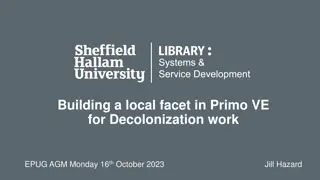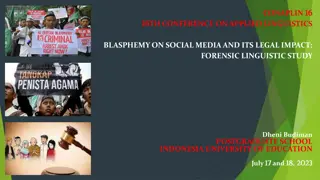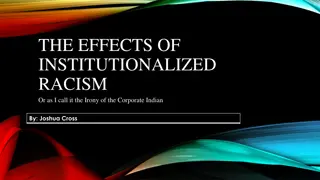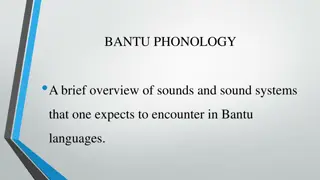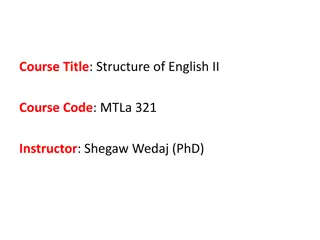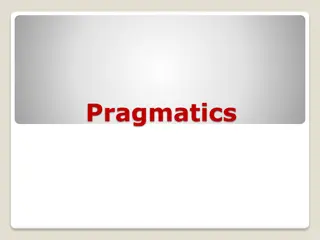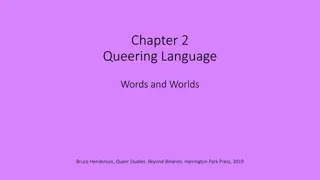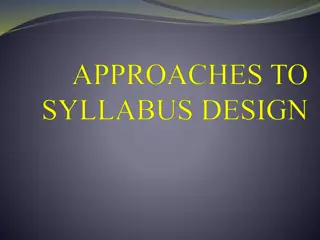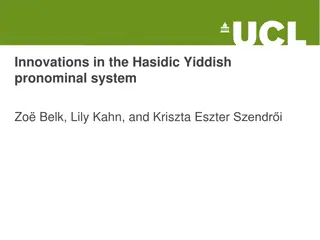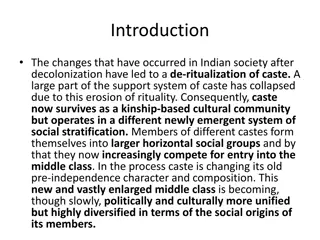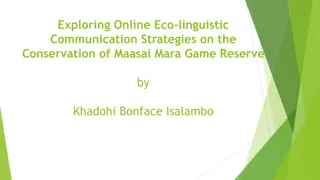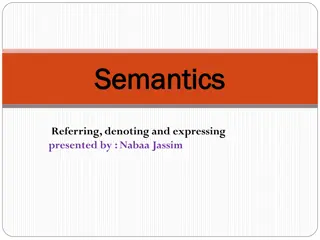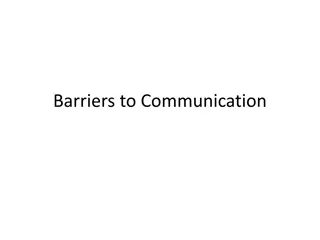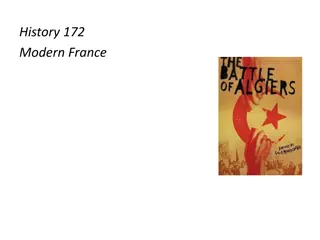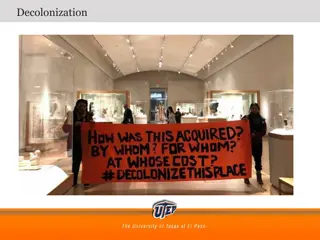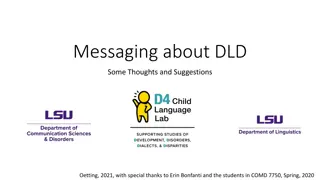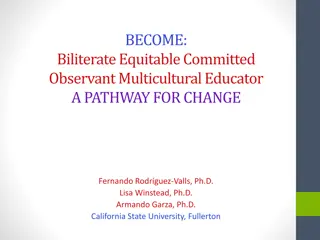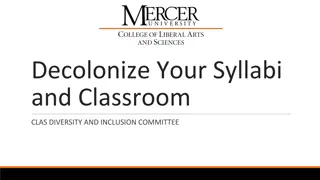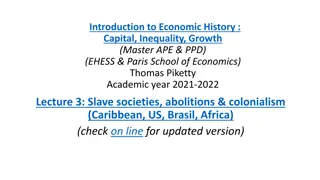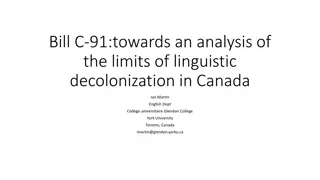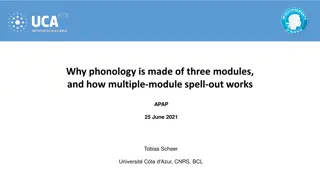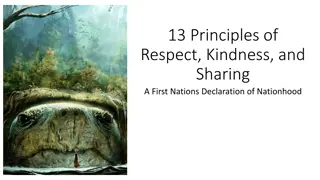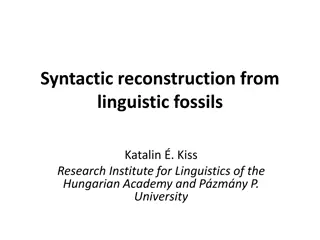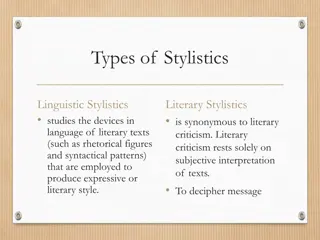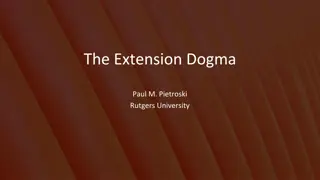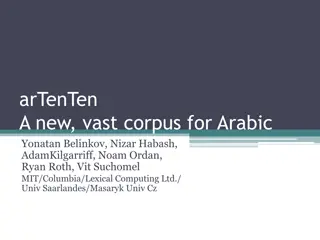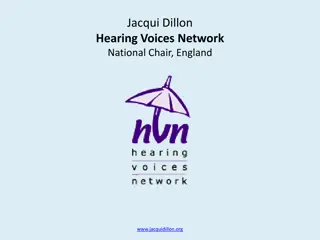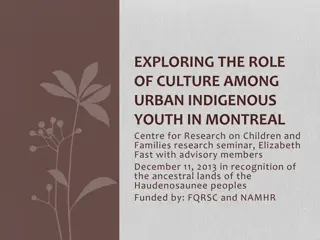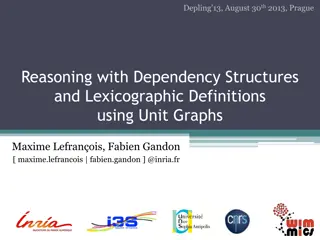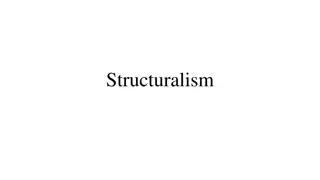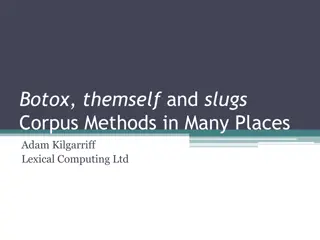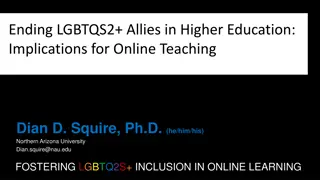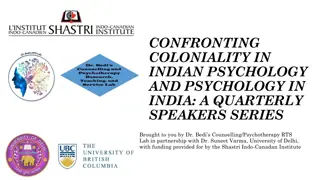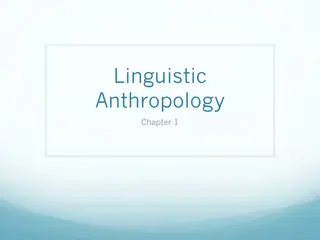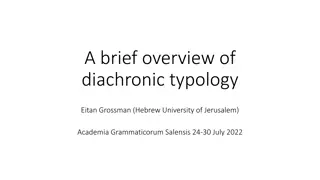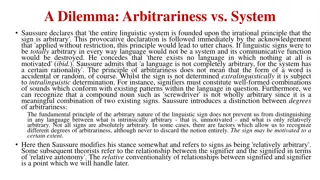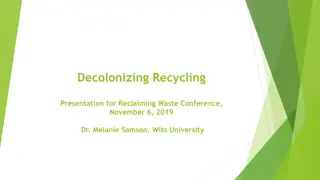Building a local facet in Primo VE for Decolonization work
Explore the process of adding publisher/place of publication as a search parameter in Library Search, with insights on using MARC fields, establishing normalization rules, and steps to enable and translate local fields for effective faceted searching in Primo VE. Learn about the nuances of field rec
0 views • 19 slides
Impact of Blasphemy on Social Media: Forensic Linguistic Analysis
Language plays a crucial role in human communication, especially on social media platforms where public speech can have legal consequences. This research delves into the concept of blasphemy on social media and its legal implications, focusing on linguistic forensic study. It explores how language c
7 views • 24 slides
The Significance of Media in Language Learning
Media plays a crucial role in language learning by raising awareness of the ideology behind linguistic structures and providing valuable information on society and culture. Linguists are drawn to media language for research purposes and to understand its impact on language use and attitudes. Media s
12 views • 5 slides
Empowering Students through Decolonization at MC
Explore decolonization at MC by reflecting on student feedback, empowering students to take an active role in decolonizing higher education, and integrating Indigenous knowledge. Learn how to solicit and use feedback effectively to create an inclusive and engaging learning environment.
2 views • 20 slides
Overview of Stilistik in Bachelor's Studies
Stilistik in a Bachelor's program covers theoretical basics, stylistic concepts, micro and macro stylistics, and key texts in the field. It explores stylistic analysis, linguistic disciplines, communication styles, and the impact of style on various forms of expression including everyday communicati
6 views • 63 slides
Unveiling the Effects of Institutionalized Racism on Indigenous Peoples
Delve into the intricate web of institutionalized racism faced by Indigenous communities, exploring key concepts like covert racism versus operant racism, decolonization, and settler benefits. Learn how historical injustices, such as the Indian Act, continue to impact Indigenous autonomy and the fig
9 views • 21 slides
Exploring Bantu Phonology and Linguistic Classification
Delve into the intriguing world of Bantu phonology and linguistic classification, covering the diverse sounds and phonological processes found in Bantu languages. Discover the rich heritage of over 500 Bantu languages in sub-Saharan Africa, classified into zones and classes, shedding light on the fa
0 views • 38 slides
Understanding Structural Linguistics: An Exploration of Language and Signs
Delve into the intricate world of structural linguistics through an in-depth analysis of language components, linguistic signs, and the relationship between language and linguistics. Explore the concepts of syntagmatic vs. paradigmatic relations, linguistic signs as associations of sound and meaning
4 views • 62 slides
Exploring Pragmatics in Linguistics Studies
Pragmatics delves into the study of implied meanings and how we interpret language in various contexts. It focuses on understanding communication beyond explicit words and explores the invisible meanings conveyed through situational and linguistic contexts. Deixis, physical context, and linguistic c
0 views • 41 slides
Exploring Queer Language and World
Examining the linguistic aspects of queerness, this content delves into the history and evolution of terms like queer and homosexual. It discusses the reclaiming of queer identity, its association with leftist politics, and the linguistic reclamation process. Various perspectives on queer terminolog
0 views • 24 slides
Understanding Language Teaching Syllabus: Integration, Theory, and Approaches
Language Teaching Syllabus involves the integration of subject matter and linguistic elements, guided by theories of language and learning. Various approaches like Grammatical, Situational, Communicative, and Analytic are used to structure syllabi. Breaking language into parts aids in sequential lea
1 views • 28 slides
Innovations in Hasidic Yiddish Pronominal System
Explore the evolution of pronouns in the Hasidic Yiddish language system, showcasing simplifications and changes over time. The research delves into the linguistic characteristics of Hasidic Yiddish speakers in Stamford Hill, London, highlighting the influences of various Hasidic groups and geograph
1 views • 24 slides
Evolution of Caste in Post-Colonial Indian Society
Changes in Indian society post decolonization have led to the de-ritualization of caste, resulting in a shift towards a kinship-based cultural community operating in a new system of social stratification. Secularization of caste has detached it from ritual hierarchy and aligned it with competitive d
5 views • 10 slides
Strategies for Online Eco-Linguistic Communication in Maasai Mara Conservation
Maasai Mara faces threats from human encroachment, prompting conservation efforts. This study explores online eco-linguistic strategies for engaging the public in conservation activities. The importance of language in online communication to achieve ecological harmony is highlighted, emphasizing eco
0 views • 17 slides
Understanding Semantics: Exploring Linguistic Meaning and Expression
Exploring the realm of semantics, this content delves into how language is used to refer, denote, and express concepts in the world. It discusses the importance of linguistic meaning, different approaches to studying it, and the distinction between denotational and cognitive semantics. By examining
0 views • 7 slides
Understanding and Overcoming Communication Barriers
Communication barriers, such as physical, linguistic, cultural, mechanical, organizational, and psychological factors, can hinder effective message transmission and understanding. Physical barriers like noise and environmental stress, linguistic barriers including language ambiguity and jargon, cult
0 views • 11 slides
The Algerian War and Decolonization in Modern France
The Algerian War of Independence (1954-1962) marked a significant chapter in modern French history, leading to the decolonization of Algeria. The conflict involved brutal tactics, mass expropriations, and human rights violations, as France sought to exploit Algeria for economic gain. The rule over A
6 views • 34 slides
Understanding Decolonization and Self-Reflection
Decolonization is a multifaceted process encompassing cultural, psychological, political, and economic aspects. It involves reclaiming what was taken, repatriating land, power, and privilege, and resisting colonial forces. To decolonize oneself, it's essential to consider the psychological and spiri
3 views • 85 slides
Linguistic Microaggressions in Messaging about DLD: Thoughts and Suggestions
Linguistic microaggressions in the discourse surrounding Developmental Language Disorder (DLD) can perpetuate negative stereotypes and harm individuals. This content discusses the concept of linguistic microaggressions, explores the ambiguity in messaging about DLD, and highlights the importance of
3 views • 12 slides
Culturally Responsive Biliteracy in Inclusive Education
Culturally responsive biliteracy in inclusive education emphasizes the importance of teaching in two languages, valuing diverse cultural and linguistic identities, and creating a participatory and inclusive classroom environment. Educators play a crucial role in fostering language development and ac
0 views • 12 slides
Decolonize Your Syllabi and Classroom Workshop Overview
Explore the importance of decolonizing your syllabi and classroom to create inclusive environments. Understand the core concepts of diversity, inclusion, and decolonization in education. Learn how to rethink and reconstruct your course to amplify diverse voices and challenge colonial hierarchies. Di
0 views • 9 slides
Slave Societies, Abolitions, and Colonialism: Economic History Overview
Explore the impact of slavery, abolition movements, and colonialism on economic structures in societies such as Britain, France, the USA, Brazil, Africa, and the Caribbean. Delve into the nuances of slave societies, the abolition process, extreme inequality, colonial finances, and decolonization in
0 views • 43 slides
Limits of Linguistic Decolonization in Canada: An Analysis
This analysis delves into the complexities of linguistic decolonization in Canada, exploring the historical encounters between Indigenous peoples and Europeans. The narrative emphasizes the need to acknowledge both the peaceful coexistence and the devastating impacts of colonialism on Indigenous com
0 views • 59 slides
The Three Modules of Phonology and Multiple-Module Spell-Out Systems
Phonology is structured into three modules - Sonority, Laryngeal, and Place - each with its own vocabulary and skeleton for computation. These modules interact in multiple-module spell-out systems to map linguistic structures onto phonetic realizations. Sonority, involving the audibility of linguist
0 views • 67 slides
Principles of Respect, Kindness, and Sharing: A First Nations Declaration
In this declaration, the author emphasizes the responsibility of First Nations as caretakers of their ancestral lands. It discusses the historical exclusion of First Peoples in the formation of Canada and calls for the recognition and preservation of Indigenous rights and sovereignty. The text highl
0 views • 16 slides
Syntactic Reconstruction from Linguistic Fossils in Uralic Languages
Linguistic fossils provide valuable insights for syntactic reconstruction in Uralic languages like Hungarian, Eastern Khanty, and Samoyedic. Through a case study, constraints on topical objects and grammatical systems are examined using linguistic fragments.
0 views • 34 slides
Understanding Linguistic and Literary Stylistics
Linguistic Stylistics explores devices in language of literary texts to create expressive styles. Literary criticism relies on subjective interpretation, while Stylistic Analysis in linguistics identifies patterns in speech and writing. This content delves into the phonological, graphological, and l
0 views • 17 slides
The Extension Dogma: Exploring Meaning and Extensions in Linguistic Expressions
The Extension Dogma challenges the assumption that linguistic expressions inherently possess meanings. Instead, it posits that expressions have extensions without necessary meanings that determine them. Theories of meaning should focus on the extensions of expressions, while psychological studies of
0 views • 30 slides
Introduction to arTenTen: A New Vast Corpus for Arabic Linguistic Processing
arTenTen is a new corpus for Arabic containing a vast array of text types, rich metadata, and clean linguistic processing capabilities. It offers a significant improvement over existing Arabic corpora, presenting a larger dataset with a variety of linguistic features. The corpus is fully processed,
0 views • 8 slides
Understanding the Hearing Voices Movement and HVN Network
The Hearing Voices Movement challenges traditional psychiatric views on voice-hearing by emphasizing the significance of personal experiences, trauma, and the need for authentic partnerships. HVN provides sanctuary for individuals to share and explore their experiences without fear of censorship or
0 views • 15 slides
Cultural Identity Exploration among Urban Indigenous Youth in Montreal
This research seminar explores the role of culture in the lives of urban Indigenous youth in Montreal, focusing on identity, decolonization, and the challenges faced by youth in maintaining their cultural heritage. It delves into the impact of urban migration on Indigenous populations and aims to un
0 views • 39 slides
Reasoning with Dependency Structures and Lexicographic Definitions using Unit Graphs
This piece discusses the application of knowledge representation in addressing recurrent needs related to manipulating, querying, reasoning, and sharing information, particularly in the linguistic domain of Meaning-Text Theory. Maxime Lefrançois and Fabien Gandon explore formalisms, such as the the
0 views • 56 slides
Understanding Structuralism in Linguistics: An Overview
Structuralism emerged as a dominant approach in linguistic studies from the 1920s to the 1960s, led by figures like Ferdinand de Saussure. This philosophical perspective focused on the study of language as a stable system of signs, emphasizing the interrelation of mental representations of sounds an
1 views • 28 slides
Understanding Linguistic Features in Trademarks and Branding
Explore the nuances of linguistic features in trademarks and branding through topics such as generic vs. name-like words, trade mark infringement cases, capitalization norms, and the significance of corpus analysis in understanding language usage in branding. Discover how linguistic expertise plays
0 views • 22 slides
Fostering LGBTQ2S+ Inclusion in Online Learning
Solidarity work in higher education involves an ongoing, principled yet ego-conscious, and action-engaged process. The concept of the ally industrial complex highlights the commodification and exploitation of allyship in activism. Being an accomplice signifies working together towards total liberati
0 views • 8 slides
Decolonizing Indian Psychology: A Speaker Series for Awareness and Transformation
Explore the legacy of colonialism on Indian psychology and confront the influence of EuroAmerican psychology through a decolonizing framework. This quarterly speaker series aims to mobilize knowledge and promote the application of indigenous healing practices, fostering greater societal awareness an
0 views • 6 slides
Understanding Linguistic Anthropology and Anthropology: A Comprehensive Overview
Delve into the realm of linguistic anthropology and anthropology to explore the study of humans, culture, language, biology, artifacts, and more. Discover the four fields of anthropology, the holistic approach, and the importance of cultural relativism while avoiding ethnocentrism. Learn how linguis
0 views • 25 slides
Exploring Diachronic Typology and Linguistic Diversity
Delve into the fascinating realm of diachronic typology and linguistic properties across languages in time and space. Uncover the distribution of linguistic features, the past tense in various languages, and the underlying constraints shaping language structures. Discover the intricate interactions
0 views • 99 slides
The Principle of Arbitrariness in Linguistic Signs: Saussure's Insight
Saussure's declaration on the arbitrariness of linguistic signs is thought-provoking, emphasizing that while signs are arbitrary, complete arbitrariness would lead to chaos. He distinguishes between degrees of arbitrariness and acknowledges that signs are not entirely arbitrary, being subject to lin
0 views • 9 slides
Decolonizing Recycling in Waste Management: A Critical Analysis
Dr. Melanie Samson from Wits University presented on the decolonization of recycling practices at the Reclaiming Waste Conference. The discussion focused on challenging colonial assumptions in waste management, including the impact of municipal interventions on informal waste pickers. The presentati
0 views • 15 slides
